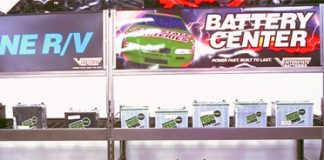Here’s the latest reader question, along with my reply!
George asks: You’ve written about problems finding tires for your muscle car because of the limited availability of performance tires for the original wheels. Why not just use larger wheels? Would this devalue the car?
My reply: The wheel does turn!
A good example being that when muscle cars were new all the then-available performance tires were made for them – for the obvious reasons. One was that back in the ’60s and ’70s, a 15×7 or 15×8 wheel was about as big a wheel as came on a performance car. And almost all of them were . . . stamped steel. Aluminum or “mag” (magnesium) wheels were extremely exotic until the mid-late 1970s, when aluminum wheels began to get traction. (Real magnesium wheels never did – outside of the race track.)
Today, a 15-inch wheel is a very small wheel. Only a few economy cars even offer them. Most new/late-model cars have at least 16 inch wheels and performance cars usually have 17 or 18 inch (or larger) wheels.
And so, all the performance tires – particularly those with H (130) or higher speed ratings – are made for those wheels. So if you want those tires, you have to change wheels.
Why don’t I?
I don’t like the look of wheels larger than 15×8 on the old stuff like mine; it changes the proportions in a way never conceived of 40-50 years ago. Modern 17-plus inch wheels are two-plus inches taller than 15-inch wheels; the tire’s sidewall is shaved down by about the same two inches, to make it all even out. This looks ok on a modern car designed for that look – but I think it looks awkward.
They also mar the historicity of the car.
One of the things that was appealing about the old muscle cars was that most came with or offered unique to that model/make wheels that helped define the car as (for example) a Pontiac and then a Trans-Am.
No other car came with Pontiac Rally or Honeycomb or Snowflake or Turbine wheels. And these wheels were all strikingly different-looking than wheels made by other car companies for their cars.
Modern wheels are – like modern cars – strikingly homogenous. Not ugly. But same-same. Variations of the same lattice/pie-cutter (and so on) themes. I can’t think of any new/late-model wheel that is immediately recognizable as a specific brand/model’s wheels.
So, for me, removing my TA’s 15×7 Honeycombs would be like performing plastic surgery on Elvis – when he was young and good looking – to try to “improve” him.
You can’t improve things that are right.
All you can do is change them – and not for the better!
. . .
Got a question about cars, Libertarian politics – or anything else? Click on the “ask Eric” link and send ’em in!
If you like what you’ve found here please consider supporting EPautos.
We depend on you to keep the wheels turning!
Our donate button is here.
If you prefer not to use PayPal, our mailing address is:
EPautos
721 Hummingbird Lane SE
Copper Hill, VA 24079
PS: Get an EPautos magnet (pictured below) in return for a $20 or more one-time donation or a $10 or more monthly recurring donation. (Please be sure to tell us you want a sticker – and also, provide an address, so we know where to mail the thing!)
My latest eBook is also available for your favorite price – free! Click here. 












When the wife got her 95 Cutlass Supreme Sl, it had 4 wheel disc brakes. If you slammed on the brakes it would throw the passenger into the windshield without a belt on or being strong and bracing themselves. It was definitely an improvement over rear drums.
I agree with you, not a fan of low pro tires.
Curious though, ever do a Tremec 5/6spd conversion, disc brakes and other stuff like that? I’m a modder, so anything I get my hands on doesn’t stay stock for long (So if you have a mod list somewhere, mind relinking the article?)
Hi Zane,
I did put an OD transmission in my car. But it doesn’t alter the character of the car. Visually, it’s almost impossible to tell the difference. I thought about rear discs – bolt on (’77-81 cars could be ordered with them from the factory) but decided against because my car isn’t driven hard enough for high-performance brakes to be necessary. The stock brakes are actually ok for normal everyday driving!
Good call. IMO, unless your ride has a mid or rear engine layout, rear discs are OVERKILL. Even in a front-engine, RWD, the front brakes do about 65% of the braking effort, it’s about 85-15 split on FWD. Your money is better spent on upgraded rotors (drilled, slotted, or dual-surfaced with fins) and modern ceramic pads.
As for the gear box, the Tremec 5 spd simply gives the T/A the top speed and relatively low RPMs it ought to have had all along. Does your T/A have the Pontiac 400? If so, with an 0.80 OD and a moderate cam, at 75 mph that engine is still loafing.
On shift-for-yourself vintage Mopars, the conversion is far easier. Get an A833 “OD”, used, ironically, on ECONOMY versions of the Dodge Dart or Plymouth Duster, the “Feather Duster”, with a tuned-for-economy 225 2bbl Slant Six and this gear box, could deliver 30 mph on the highway (at 55 mph, which was in the era when the Interstates, were, as you’d put it, “GIMPED”!). The A833 “Overdrive”, however, is strong enough, even with its aluminum case (the boys at New Process built decent gear boxes), to take whatever any Mopar V8 will dish out.
Still running factory original rear brake shoes at over 100K on my FWD car.
I bought a new set of shoes for it, but twice now I’ve just slapped the drums back on because the original shoes were still at least 50%.
I just put on the third set of rotors a little while back.
I would love that on my 63 Signet. Wish I could adapt that 4 speed for the column. It’s one of my favorite things about it.
Rolling 13s bitchez. Don’ H8.